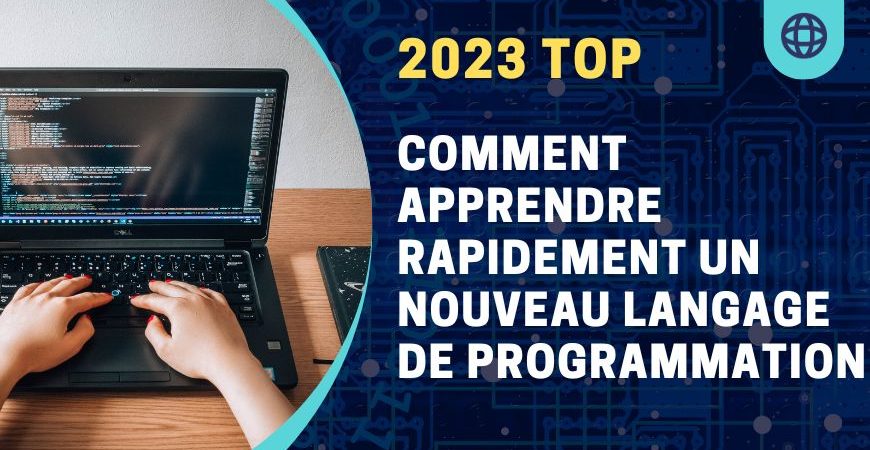how to learn a new programming language quickly
Learning a new programming language quickly can be a challenging but rewarding endeavor. Here’s a step-by-step guide to help you learn a new programming language efficiently:
Choose the Right Language:
Consider your goals and why you want to learn the language. Is it for web development, data analysis, mobile app development, or something else? Choose a language that aligns with your objectives.
Research the popularity and job market demand for the language, as this can be a motivating factor.
Set Clear Goals:
Define what you want to achieve with the language. Having clear goals will help you stay focused and measure your progress.
Collect Learning Resources:
Find quality learning resources such as books, online tutorials, documentation, and video courses. Popular programming languages often have an abundance of resources available.
Websites like Codecademy, Coursera, Udacity, edX, and Pluralsight offer courses on various programming languages.
Start with the Basics:
Begin with the fundamental concepts of the language, including syntax, data types, variables, and control structures (e.g., loops and conditionals).
Practice writing simple programs to reinforce your understanding.
Hands-On Coding:
Learning by doing is essential. Work on real projects or coding exercises to apply what you’ve learned.
Collaborate with others on open-source projects or join coding communities to get feedback and learn from experienced programmers.
Read Documentation:
Explore the official documentation for the language. It’s a valuable resource for understanding the language’s features and functions.
Use Online Coding Platforms:
Websites like LeetCode, HackerRank, and Exercism.io provide coding challenges in various languages, allowing you to practice problem-solving and algorithmic thinking.
Build Projects:
Create small projects that gradually increase in complexity. This hands-on experience is invaluable for mastering a language.
Projects could include web applications, mobile apps, games, or data analysis scripts, depending on your goals.
Learn Frameworks and Libraries:
Familiarize yourself with popular frameworks and libraries associated with the language. They can significantly speed up development.
For example, if you’re learning JavaScript, explore frameworks like React or Angular for web development.
Seek Help and Feedback:
Don’t hesitate to ask questions on programming forums, social media, or developer communities like Stack Overflow. Learning from others’ experiences is powerful.
Share your code for feedback to improve your coding skills.
Stay Consistent:
Dedicate regular time to learning and practicing the language. Consistency is key to making progress quickly.
Learn from Mistakes:
Don’t be discouraged by errors and bugs. Mistakes are a natural part of learning. Analyze them, understand the problem, and find solutions.
Stay Updated:
Programming languages evolve over time. Stay informed about updates, new features, and best practices.
Teach Others:
Teaching is a powerful way to reinforce your own learning. Share your knowledge with others through blogs, tutorials, or mentoring.
Stay Curious and Patient:
Learning a new language can be challenging, but it’s also a rewarding experience. Stay curious, patient, and persistent in your learning journey.
Remember that becoming proficient in a new programming language takes time and practice. The more effort and dedication you put into learning and building projects, the faster you’ll become proficient in that language.

7 perfect stops for a west of Ireland trip

The World Tourism Organization Awards Best Tourist Villages

The visa to France.. this is new

The worst snow storm to ever hit the United States

Watch Dacia Aroche Duster Renault 2022 enter Algeria for the first time

The most famous and beautiful sayings of the French writer Voltaire

2025 Seauto Crab Pro Pool Cleaning Robot – Smart, Efficient, and Wall-Climbing!

2024’s Best Cooling Maternity Pillow – Full Body Support for Pregnancy Comfort

Premium Pregnancy Body Pillow – Optimal Support for Better Sleep

🔥 MXQ-Pro Smart TV BOX – Turn Your TV into a 4K Media Hub for Under €14!

Elegant 10K White Gold Diamond Ring Set – Perfect for Weddings or Gifts

👉 🕒 Elegance and Reliability: Gold-Plated Luxury Women’s Watch

Real Estate Prices in 2025: What Trends to Expect?

The Real Estate Market in 2025: Trends, Challenges, and Opportunities

BYD Seal U DM-i (2025) – The new plug-in hybrid SUV that aims to shake things up

BYD: The Chinese giant changing the rules of the global auto market

🔥 2026 Honda S2000 – The Legendary Comeback Announced! 🔥

11 Used European Sports Cars You Can’t Miss

🚗 French Car Models to Watch in 2025

LG Showcases AI Innovations at CES Las Vegas 2025

Audi S8 2025 vs. Volkswagen Beetle 2025: Luxury Meets Iconic Design

GIVE THIS NEW TESLA A NAME!!

The Minister of Industry calls for lowering the prices of Opel cars to meet the expectations of Algerian consumers

who is the founder of YouTube, what year, how it went global and how it became affiliated with Google

who is the founder of Google, in what year and how it became global

list of the 10 most visited sites in the world!

The Bibliothèque of Diligence and Honesty

« The Redemption of Broken Hearts »

How to Win Hearts and Make People Love You
Comment Gagner de l’Argent sur Internet en 2023 : Le Top 25

Preserving the Environment and Meeting Needs: Environmental Research Projects Support Desalination Efforts on the Algerian Coast
« Icon of the Seas: Exploring the World’s Largest Cruise Ship Amidst Ecological Concerns »

« Sonatrach: Selection of 266 Candidates Following the Recruitment Competition in Adrar and Timimoun »

Paradise Beaches: The Top 10 Destinations according to TripAdvisor in 2023

Le plus grand paquebot du monde, « Icon of the Seas », fera cinq fois la taille du Titanic : portrait d’une aberration

Augmentation inattendue des primes d’assurance habitation en France pour les Algériens résidant dans le pays

India will become the world’s second largest economy by 2075, surpassing the United States

Heat wave in Algeria: Weather alert with temperatures reaching 49 ° C

Meet Thermonator, a terrifying flame-throwing robot dog

Where will artificial intelligence lead us?

Tragedy Strikes as Submarine Titan Lost at Sea Near Titanic Wreckage

Actor’s Terrifying Account of « Titan » Submarine Trip to Titanic Wreck Reveals Serious Malfunctions

What is the economy? And how does it work to achieve the welfare of people?

Dazzling: The discovery of an « incredible » sword thousands of years old that still shines

Elon Musk threatens to implement talent subscriptions to Twitter Blue

Schengen visa: 10 easiest countries in 2023

With a political message: The Syrian star, Shukran Murtaji, thanks the Algerian government and people

Liste des sites de petites annonces en Algérie

Découvrez les meilleurs sites de petites annonces en Algérie

Turkish citizens to receive free natural gas for a year as country reaches historic milestone

After a SpaceX rocket explodes, Elon Musk loses $13 billion in one day

« Twitter Controversy: Celebrities Lose Authentication Marks Due to Musk’s New Policy »

Elon Musk Replaces Twitter’s Blue Bird with Dogecoin

« President of the German Banking Association: The risk of a comprehensive banking crisis in Europe is very low »

Germany.. Investor sentiment for the Volkswagen factory fell unexpectedly in April

« Sodium: an economical solution for cheaper electric cars? »

« Europe: The end of thermal cars in 2035 compromised by e-fuels? »

« The legendary Nissan Skyline GT-R is preparing its big comeback in electric version »

« The French automotive industry in difficulty: hundreds of thousands of European thermal cars unsold in China »

Earn money online with these sitesWork from home to supply your income



Leave a Reply